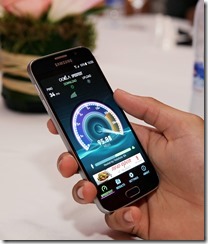Coming up to two years since his appointment as Vodafone Qatar CEO in June 2013, Kyle Whitehill has been able to infuse the Qatar cellco with the type of energy associated with Vodafone Group companies worldwide. Investing heavily in people and technology, Vodafone Qatar is carving out a successful niche for itself in this small Gulf market, which stands out as Vodafone’s only direct investment in the Middle East
Kyle Whitehill has been CEO of Vodafone Qatar since June 2013, a period in which the company’s share price has almost doubled
In January, Vodafone Qatar stated that for the nine months to December 31, 2014 net loss for the period amounted to QAR150 million (US$41.2 million), an improvement of 30 per cent year-on-year. Total revenue for the period amounted to QAR1.74 billion, up 21 per cent year-on-year, while subscriber numbers totalled 1.41 million, up 11 per cent from a year earlier.
The cellco reported that mobile ARPU had remained stable at QAR125 for the nine-month period, with EBITDA having grown 22 per cent year-on-year to QAR421 million, and its EBITDA margin remaining stable at 24 per cent.
Distributable profit increased 71 per cent year-on-year to QAR152 million, the company also detailed.
In the time since Whitehill became Vodafone Qatar CEO and the end of 2014, the cellco’s share price rose steadily from QAR9 to QAR16.45, reflecting the fact that the cellco’s strategy to become a mass-market consumer brand is supported by stakeholders outside of the organisation as well. The share price has climbed further during the course of 2015.
“Fifty-five per cent of our stock is free float on the Qatar Stock Exchange, and we count over 41,000 shareholders,” Kyle Whitehill told Comm. “This means we have a broad-based investor profile, and as a mass-market consumer brand, we are the first in Qatar.”
Whitehill says Vodafone Qatar is also looking to become the data provider of choice in the country, though this will not come at any price, as witnessed in December 2014 when Vodafone Qatar walked away from the US$57 million deal to acquire Qatar National Broadband Network (QNBN), the country’s state-owned fixed broadband operator; two months after it announced a non-binding agreement with the firm.
The deal would have seen Vodafone Qatar fully own the broadband operator, and in explanation of its change of direction, the cellco simply stated that “following a due diligence and negotiation process, the parties have determined not to proceed with the transaction”.
QNBN is in the process of rolling out a fibre network across the country and has contracts with both Vodafone Qatar and Ooredoo for the provision of wholesale broadband capacity.
Vodafone Qatar has not let flirtations with QNBN distract its own progress, having continued to make data the centre of its developmental agenda with the launch of its 4G network, which it said would incorporate the newest content proposition and in-store experience, in June 2014.
“There are maybe 100 large international companies in Qatar, and they all have a strong thirst for data,” Whitehill said. “There is also an early stage small and medium size enterprise (SME) market and we expect to see more vibrancy in this sector going forward. We also have a digitally savvy mobile consumer base in Qatar, with the highest smartphone adoption rate (in the Gulf) after the UAE, so huge potential exists there as well,” he added.
Whitehill acknowledges that monetisation of data services remains one of the telco industry’s biggest challenges, and that the manner in which consumers utilise data is important given that 80-90% of mobile data is consumed over Wi-Fi, which is more challenging to charge for.
Earlier in May 2015, Vodafone Qatar stated that in the past five months alone, the cellco has invested more than QAR500 million in its network infrastructure and mobilised a team of hundreds of engineers and technicians in support of Qatar National Vision 2030.
In January this year, the cellco began phase-one of its network evolution by upgrading every network site in the Qatar capital Doha with the latest state-of-the-art technology, which means 65 per cent of its network is brand new. In addition the company installed 134 new outdoor sites, 42 indoor sites, 290 4G outdoor sites and 25 4G indoor sites. With this, Vodafone Qatar estimated that it increased both its 3G and 4G coverage, doubled its 3G capacity, tripled its 4G capacity, and tripled its data capacity for better user experience.
The completion of this phase of the network upgrade also marked the launch of 4G+ by Vodafone Qatar, less than a year after its 4G launch.
Seventy per cent of Vodafone Qatar’s 4G network sites are now 4G+ capable giving the cellco the widest 4G+ coverage in the country with speeds of up to 150Mbps and an average 30Mbps.
Vodafone Qatar claims that 70 per cent of its 4G network sites are now 4G+ capable giving the cellco the widest 4G+ coverage with speeds of up to 150Mbps and an average 30Mbps
“There is a lot of innovation around how customers can drive our business forward, and the offer of choice is an important aspect in that,” Whitehill explained. “The cost of calling India has fallen by 20 per cent since Vodafone Qatar launched, and in terms of giving value back to customers, I believe we are an incredible number two player in the country.”
As an “incredible player”, Vodafone Qatar has also been bolstering its human resources ranks, having announced the appointment of Mahmud Awad as chief business officer and Ramy Reyad as chief technology officer in April 2014.
With 18 years of telecom experience, Awad joined Vodafone Qatar from UAE telco Du where he was the VP of corporate sales leading a sales team of 100 professionals. During his time at Du, Awad created new revenue streams, introduced more industry specific solutions and established an end-to-end solution sales approach. Awad has also held executive roles with Neoris, Al Wataniya Telecom and Nokia Solutions & Networks.
Reyad has over 15 years of experience in telecom and joined Vodafone Qatar from Mobilink. As Mobilink’s CTO he successfully transformed the Mobilink technical department to optimise cost and investment. He also directed critical technical projects and oversaw the rollout of new capacity projects. Part of Reyad’s responsibility upon appointment was to lead Vodafone into its next phase including its LTE 4G launch, while ensuring the cellco’s infrastructure supported Qatar’s knowledge based economy.
Whitehill is confident of Vodafone Qatar’s offerings both to corporate and individual customers with domestic needs as well as those with more international requirements.
“If a customer requires international connectivity, it can be provided. Domestic connectivity can be offered. We have physically connected to QNBN’s network for broadband, and opportunities such as cloud and machine-to-machine (M2M) are interesting to us and occurring in an incremental manner,” Whitehill explained. “Our subscriber base continues to grow and we provide the best data network in the country, which is the direction we want to continue to head down,” Whitehall concluded.





0 comments ↓
There are no comments yet...Kick things off by filling out the form below.
Leave a Comment